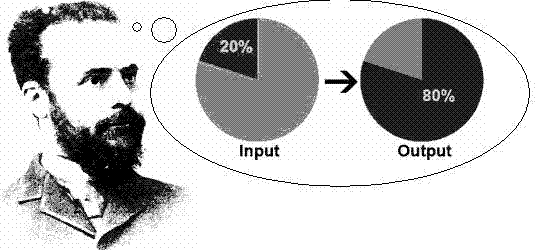
Vilfredo Pareto died in Celigny on August 19, 1923.


“The Mind and Society” is the English title of the translated work in which the Pareto Principle finds its origin. More generally, the Pareto Principle is the observation (not law) that most things in life are not distributed evenly. One anecdote commonly shared was that he wrote the entire book “The Mind and Society” (approximately 500 pages) in the same pair of shoes and suit of clothes. Despite his success and monetary fortune he was known by his friends as indifferent to external trappings. He had already settled in Celigny near Geneva, Switzerland. In 1907 Pareto received another more substantial inheritance from another branch of his family. The Pareto Principle also known as the 80/20 rule and the law of the vital few states that 80 of the results come from 20 of the causes. He held the honors afforded by his social status and the plutocratic democracy of Italy in contempt the rest of his life. Pareto relocated to Switzerland, never to reside in Italy again. When asked to name his successor in 1894, he designated Pareto. Walras was the chair of political economy at Lausanne. During these years a friend connected him with a reputed Swiss economist, Leon Walras. He retired with his wife and mother to Florence where he embarked on a 12 year endeavor to obtain a professorship of economics in Italian academia. In 1882 his father died and left him with a small inheritance. Pareto Improvement: Under the rubric of neoclassical economic theory, a Pareto improvement occurs when a change in allocation harms no one and helps at least one person, given an initial. He ran for political office on a platform of free-enterprise and lost.
#PARETO PRINCIPLE ECONOMICS FREE#
In observing practical applications he was disgusted by the restraints placed on free enterprise as governmental bureaucracy increased its regulation and management of business. In economics, the Pareto Principle, also known as the 80/20 rule, can be applied in a variety of ways, including: Income distribution: There are often many nations which have a top heavy distribution, which the Pareto Principle helps describe. He noted economic theory was heavy on literature but light on science. His interest in economics grew during this time. In 1874 he became the general superintendent of three iron mines owned by the National Bank of Florence. At 22 years old Pareto started his career as a consulting engineer for the railway. His grandfather received the distinction of nobility from Napoleon.

Vilfredo Pareto was born into nobility on Jin Paris.


 0 kommentar(er)
0 kommentar(er)
